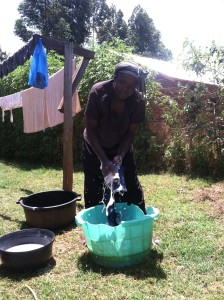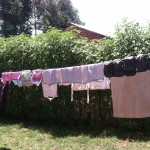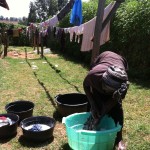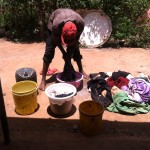In many parts of the world men and women are assigned specific duties and responsibilities, according to their gender roles. Life is duty and duty is part of our daily life. We have various tasks that are a permanent part of our “to-do” list; they can’t be neglected or there will be consequences! Domestic duties are a focal point for every healthy family, no matter what part of the globe you live on. And what duty in more delightful than laundry? Doing laundry is the way to cleanliness and cleanliness is second to godliness! Of course, here in Kenya, the process is slightly different than in the West.
 In Western countries, laundry is typically done in specific rooms or places set apart for the task–like the “laundry room.” Washing is not usually a big deal, due to the availability of washing machines and even dryers. But in our small villages the task of washing is a bit more arduous and requires a significant investment of time and effort.
In Western countries, laundry is typically done in specific rooms or places set apart for the task–like the “laundry room.” Washing is not usually a big deal, due to the availability of washing machines and even dryers. But in our small villages the task of washing is a bit more arduous and requires a significant investment of time and effort.
This work is typically regarded as a feminine role and unsuitable for men. In the past few years, however, this notion has been undergoing changes in some places, as both men and women are now cooperating in putting bread on the table, leaving men with no excuse for shunning the task. Sometimes these families will hire a day laborer to do wash if they do not do it themselves. Laundry washers are paid based on the number of family members; if the family has many children it implies that many clothes are to be washed, and the more the clothes, the higher the wage.
In families where the man is a bread-winner, the task of laundry is relegated solely to the woman who remains behind to take care of the house and children. In past days, laundry was done in rivers and other water courses, allowing the dirt and stains on clothes to be carried away by the water. This is still practiced in many villages of Africa and Asia. Washing in this way makes laundry easier and faster for the village dwellers; they don’t have to fetch water for washing, and they can use the rocks that are already there. Clothes are rubbed, twisted and slapped against the rocks, making it easier to remove the dirt and stains with little strain and pain. Sometimes wooden clubs could be applied to help in beating out of the garments. In regions where rivers and water courses are not available, laundry is done using plastic basins or metal cauldrons.
Various chemical detergents are used in laundry, such as solid soaps, liquid soaps and powder soaps, based on the financial ability of the family. Most villages families use solid and powder soaps to do washing, due to their availability and affordability. Here in Kenya the common soaps are: Jamaa bar soap, Ushindi bar soap, Sunlight washing soap, Omo powder, Toss washing powder and many other brands of soaps. These are available at local dukas (shops), since they are regularly used. However, in contrast to Western practices, very small quantities are purchased (about 10 or 20 grams, a single-use measure) rather than bulk quantities. At 5 or 10 shillings per packet, families usually buy only what they need–this might be all the extra money they have.
If using a basin, clothes are rubbed on themselves to remove simple stains; a brush may be used for more ground-in stains. Even if washing powder is used, bar soap is usually applied to stains for added cleaning power. Once the linens and clothes are clean and well rinsed, they are twisted firmly to remove most of the water. Then they are hung up on poles or clotheslines to dry, or spread out on clean grass or along hedges.
In many slums here in Kenya, the population is disproportionately widows and orphans, who often are unemployed and unqualified for high-paying jobs, due to lack of school education. Their only hope and way of making a living may be to do wash for the “rich folks.” Based on the size and number of the family members, their wages are typically 200 to 500 Ksh ($2 to $5) per day. A village employee may receive less than that.
There you have it: another look at Kenya village life. Laundry is just one of the tasks that here, as in the West, is an unavoidable part of everyday life.



